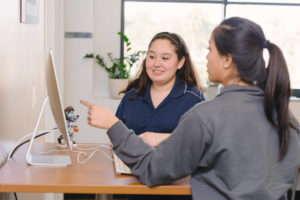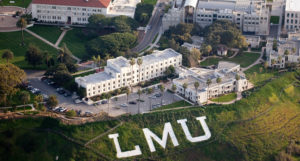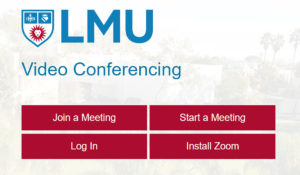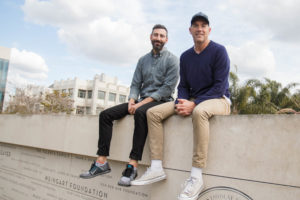
ACADEMICS | Some parents may be surprised to learn that there are professors who actually encourage their students to surf the web, use Facebook and Twitter, and play video games. From digital ad campaigns to virtual reality, educators in business, sciences and the humanities are using dynamic tools that not only teach students useful skills, but allow them to learn by actively producing quality, marketable products.
Inside the M-School Institute of Marketing at LMU students don’t just study virtual reality, they create it. M-School co-directors Andy Rohm and Matt Stefl connect students with both on-campus experts and leading industry professionals.
“We at LMU are blessed to be so close to the firms and companies, the industry change makers, such as Facebook, Google, and Electronic Arts, who are at the leading edge of new media and entertainment technology,” said Rohm. “We cannot think of another university or college that is so well positioned to be part of the future today.”
Stefl offered some comments about student work: “In fall of 2017, we launched an innovative course titled ‘Making Virtual a Reality.’ This interdisciplinary course brought together students from science and engineering, design, film and television, marketing and entrepreneurship, and asked them to solve real-world opportunities using immersive media.”
“For example,” Stefl said, “one team was tasked to raise awareness and interest in our library’s amazing special collections department. The course was co-taught by LMU alum and VR leader Logan Mulvey and me. Throughout the semester, we heard from speakers and visited companies who are leading the charge in this emerging space. Students not only learned from the experts, but from each other.”
Melanie Hubbard is the LMU digital scholarship librarian. She works with many departments, helping them use and produce digital scholarship.
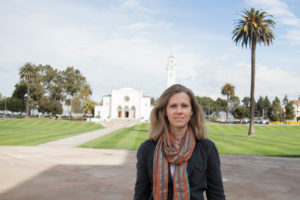
“I’m not talking about using a database to find an article,” Hubbard said. “I’m talking about consciously engaging with digital tools to dig deeper and to do scholarship otherwise not achievable or as achievable through more traditional means.”
Hubbard is both available for and actively seeks classes to work with. Her work ranges from providing simple tech lessons to designing key class projects and leading courses.
“The instruction I contribute usually involves technical guidance as well as instruction on relevant concepts,” said Hubbard, “such as information architecture, metadata, and intellectual property. In summer of 2016, I co-taught the course, The Digital Watts Project … [which] culminated in the creation of a Watts riot-related digital collection using archival materials from the Southern California Library.”
According to Hubbard, “the sciences and social sciences have been engaging with digital scholarship for quite some time. It’s an obvious and natural fit. Both areas need, for example, to visualize data, to code qualitative data, and to crunch big numbers.”
Jeremy McCallum, chair of the chemistry and biochemistry department, uses digital tools in both his scientific research and education methods.
While working on a grant with his colleagues, McCallum had difficulty covering all the material he needed to with his students and he “became interested in classroom flipping, whereby material is learned outside of class time, and time spent in class is focused on working problems.”
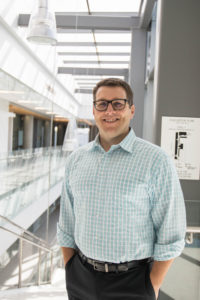
“I have always been interested in utilizing technology when appropriate,” said McCallum, “and as such, I started making videos in 2012. I have continually made and added more videos to my courses and am about at the point where I want to be … Students typically watch one video per week, so I can spend an ample amount of time in class reviewing problems and the problem-solving process.”
McCallum used to take surveys of his students to gauge their reception, but it was so consistently positive that he’s stopped asking for now. The fact that many of his YouTube videos have several thousand views (the most popular has nearly 140,000) might factor into that, as well.
The sciences aren’t the only field utilizing technology and digital media. Elizabeth Drummond, History Department chair, has helped develop LMU’s digital humanities program — a specific type of digital scholarship. Alongside Molly Youngkin, BCLA associate dean for institutional effectiveness, Drummond helped organize the BCLA Public History and Digital Humanities Symposium.
“The humanities use technology in a variety of ways – to ask new questions, to arrange and order information … and to present arguments,” said Drummond. “One of the main benefits of the digital humanities is that it has the potential to democratize knowledge and to challenge us to think about the ideological and epistemological assumptions of both our disciplines and technology.”
In history classes, student projects have ranged from websites to virtual exhibits, including partnerships with Culver City’s Wende Museum and Manchester, England’s Horsfall Space. Drummond said that “in doing so, [students] have integrated text and artifacts, engaged questions related to audience and display, and crafted narratives that are appropriate for broad audiences even as they integrate evidence from primary sources and engage the historical literature.”
Digital tools are becoming integral to our education system. Students and educators are constantly adapting to newer and newer technologies, figuring out which digital tools work for them, and which traditional methods they’d rather stick with.
But whether it is using immersive media, creating digital scholarship, or providing students access to the tools they need, LMU is making sure its campus is equipped for the 21st century.
Political science major Dylan Ramos is a junior, and a contributor to LMU This Week.


